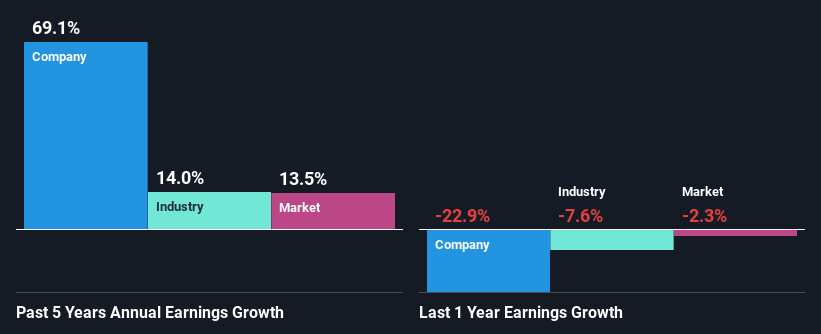Corteva, Inc.'s (NYSE:CTVA) Stock On An Uptrend: Could Fundamentals Be Driving The Momentum?
Most readers would already be aware that Corteva's (NYSE:CTVA) stock increased significantly by 19% over the past three months. Given that stock prices are usually aligned with a company's financial performance in the long-term, we decided to study its financial indicators more closely to see if they had a hand to play in the recent price move. In this article, we decided to focus on Corteva's ROE.
Return on Equity or ROE is a test of how effectively a company is growing its value and managing investors’ money. In short, ROE shows the profit each dollar generates with respect to its shareholder investments.
Check out our latest analysis for Corteva
How Do You Calculate Return On Equity?
ROE can be calculated by using the formula:
Return on Equity = Net Profit (from continuing operations) ÷ Shareholders' Equity
So, based on the above formula, the ROE for Corteva is:
3.7% = US$941m ÷ US$25b (Based on the trailing twelve months to December 2023).
The 'return' is the profit over the last twelve months. That means that for every $1 worth of shareholders' equity, the company generated $0.04 in profit.
Why Is ROE Important For Earnings Growth?
We have already established that ROE serves as an efficient profit-generating gauge for a company's future earnings. Based on how much of its profits the company chooses to reinvest or "retain", we are then able to evaluate a company's future ability to generate profits. Generally speaking, other things being equal, firms with a high return on equity and profit retention, have a higher growth rate than firms that don’t share these attributes.
Corteva's Earnings Growth And 3.7% ROE
It is hard to argue that Corteva's ROE is much good in and of itself. Even compared to the average industry ROE of 13%, the company's ROE is quite dismal. In spite of this, Corteva was able to grow its net income considerably, at a rate of 69% in the last five years. Therefore, there could be other reasons behind this growth. For example, it is possible that the company's management has made some good strategic decisions, or that the company has a low payout ratio.
We then compared Corteva's net income growth with the industry and we're pleased to see that the company's growth figure is higher when compared with the industry which has a growth rate of 14% in the same 5-year period.
Earnings growth is an important metric to consider when valuing a stock. What investors need to determine next is if the expected earnings growth, or the lack of it, is already built into the share price. This then helps them determine if the stock is placed for a bright or bleak future. What is CTVA worth today? The intrinsic value infographic in our free research report helps visualize whether CTVA is currently mispriced by the market.
Is Corteva Using Its Retained Earnings Effectively?
Corteva has a three-year median payout ratio of 35% (where it is retaining 65% of its income) which is not too low or not too high. So it seems that Corteva is reinvesting efficiently in a way that it sees impressive growth in its earnings (discussed above) and pays a dividend that's well covered.
Moreover, Corteva is determined to keep sharing its profits with shareholders which we infer from its long history of five years of paying a dividend. Existing analyst estimates suggest that the company's future payout ratio is expected to drop to 20% over the next three years. The fact that the company's ROE is expected to rise to 9.9% over the same period is explained by the drop in the payout ratio.
Summary
In total, it does look like Corteva has some positive aspects to its business. Even in spite of the low rate of return, the company has posted impressive earnings growth as a result of reinvesting heavily into its business. Having said that, the company's earnings growth is expected to slow down, as forecasted in the current analyst estimates. Are these analysts expectations based on the broad expectations for the industry, or on the company's fundamentals? Click here to be taken to our analyst's forecasts page for the company.
Have feedback on this article? Concerned about the content? Get in touch with us directly. Alternatively, email editorial-team (at) simplywallst.com.
This article by Simply Wall St is general in nature. We provide commentary based on historical data and analyst forecasts only using an unbiased methodology and our articles are not intended to be financial advice. It does not constitute a recommendation to buy or sell any stock, and does not take account of your objectives, or your financial situation. We aim to bring you long-term focused analysis driven by fundamental data. Note that our analysis may not factor in the latest price-sensitive company announcements or qualitative material. Simply Wall St has no position in any stocks mentioned.

